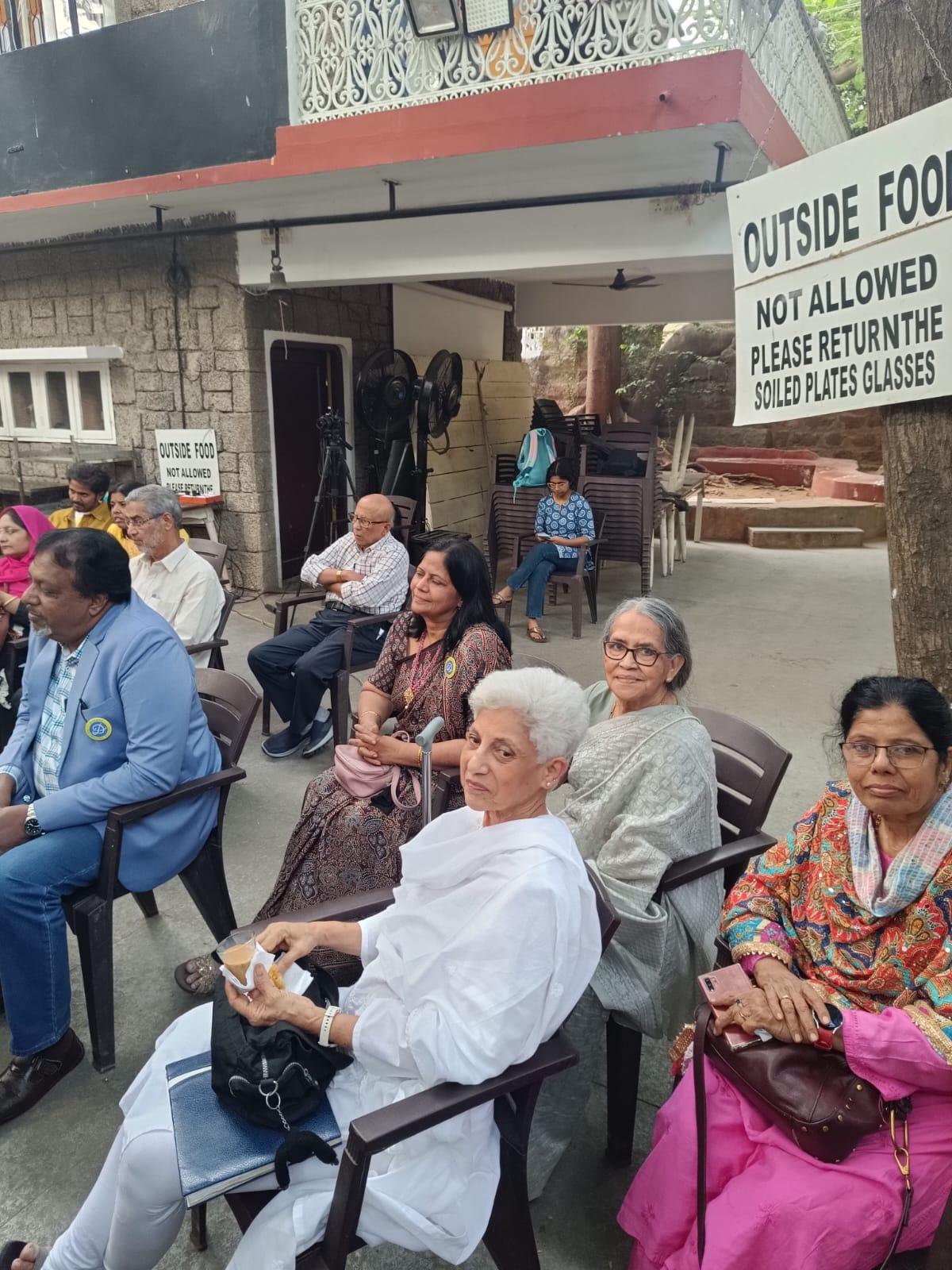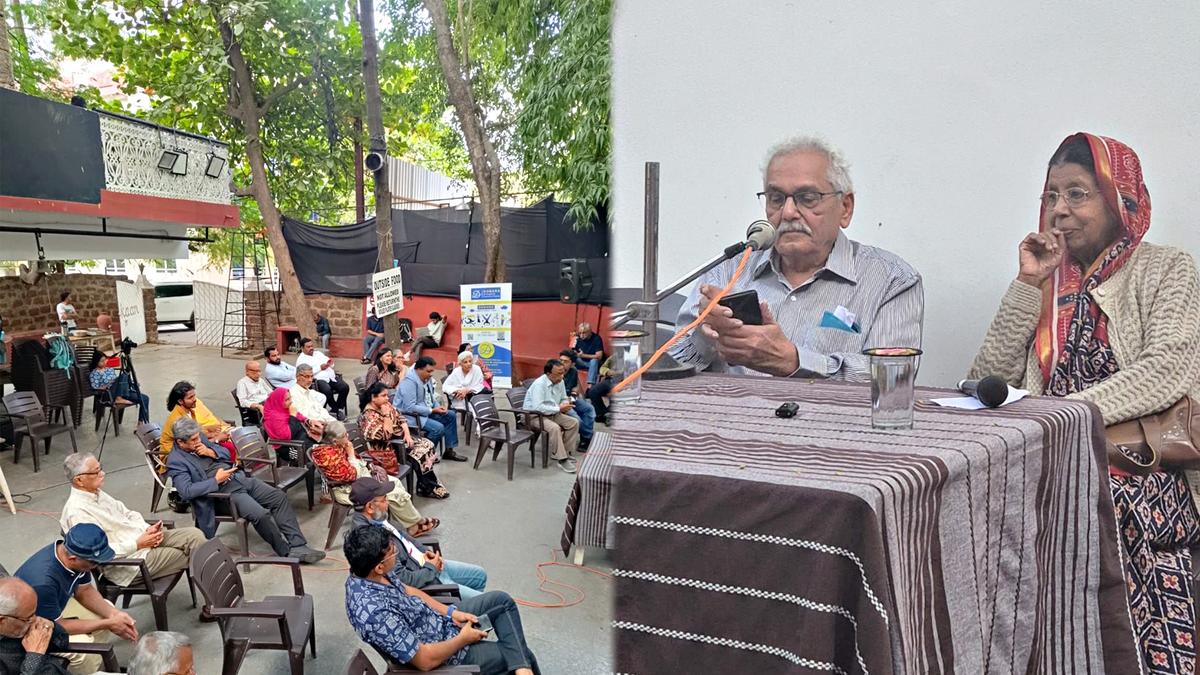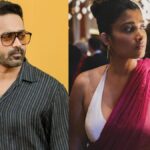
Dr Ravindra Kumar Choudhary (right) at the session; a section of the audience
| Photo Credit: Special Arrangement
A doctor by profession and a transcreator at heart… Dr Ravindra Kumar Choudhary, known by his pseudonym ‘Maun Kavi’, celebrates the written word through his translations and transcreations, the latter involves reimagining content from one language to another while maintaining its tone, intent, style and context even as it resonates with the target language.
The 77-year-old orthopaedic surgeon, who retired two years ago, is also a poet of Hindi, Urdu, English, Bengali, and Punjabi and an expert in the transcreation of Urdu poems/shayaris of renowned poets; he also translates Urdu couplets into Bengali and English and Sanskrit slokas into Hindi. Dr Ravindra was in Hyderabad for Bashir Badr Ke Safeer, an interactive session organised by Dobara, a platform for senior well-being in collaboration with Centre for Development Policy and Practice (CDPP) at Lamakaan recently.
Love for Urdu
Ravi, a native of Haryana, developed a deep love for Urdu and its ghazals while studying at Jawaharlal Medical College, Aligarh Muslim University (AMU) in 1965. His discovery of Urdu at the college forged a 47-year-old bond with the language. He fondly recalls, “The atmosphere was rich with Urdu.” Ravi’s inspiration came from the acclaimed shayar (poet) Bashir Badr, pursuing his MA at AMU, as well as from his classmate Dr Saeeda Naqvi, who encouraged him to learn Urdu.
While returning to the hostel from college, he would drop by Bashir’s house irrespective of the time of the day. “We used to talk about many topics; he often said that one should learn Urdu and read its literature from the beginning, and then read writers according to their eras.” The Friday evening gatherings at Bashir’s house came with a rule: ‘No plain listeners’. This meant that members had to either share their literary work, comment on others’ couplets/ poems, or translate what was being recited. Ravi found translation easier, so he would translate Urdu couplets into English.

A section of the audience at Lamakaan
| Photo Credit:
Special Arrangement
His passion for Urdu, its ghazals and couplets led him to a translation journey. After completing his MBBS, he joined Calcutta Medical Research Institute and went on to pursue an MS and joined his wife Dr Shyama in Ranigunj, West Bengal, to set up a medical practice. His free time was spent recollecting couplets and translating/ transcreating them from various languages to English.
Even as he did that, a decade ago, he also began to transliterate. He explains: “Transliteration is to represent a word, phrase, or text precisely in a different script, whereas translation is to convey the meaning in another language. When we transliterate, we must focus on not just what is being said but also how it is being uttered in the source language.”
Ravi recently published a Hindi book, Sri Raghav Yadaviyam, a transliteration of a Sanskrit laghukavyam of 30 stanzas, composed by saint Venkatadhvarin in the 17th century. The stanzas are fascinating, he elaborates: “If you read from the first to the last letter of the sloka, it is a Ram Katha but when you read in reverse order — from the first letter of the last word to the first of the first word, it is a Krishna katha.”
So far he has transliterated 3,000 couplets, 100 ghazals and a few poems and nazms. Prof Pradeep (his daughter’s Kannada teacher) gave him a gist of Kannada poet Gundappa’s tetrads (a group of four) to be translated into Hindi. He has translated 180 tetrads and hopes to launch a book.
He gets nostalgic over his love for ghazal couplets; “Ghazals are a bunch of distinct flowers connected only by rhyme. The verse in it is a constituent unit on its own. It has nothing to follow or precede, as each couplet is a complete collection.”
Published – November 28, 2024 12:48 pm IST
#Septuagenarian #Ravindra #Kumar #Choudharys #interactive #session #Bashir #Badr #Safeer #celebrates #poetry



